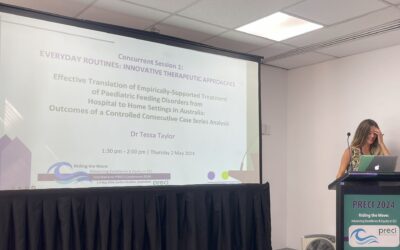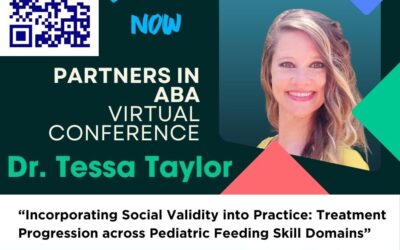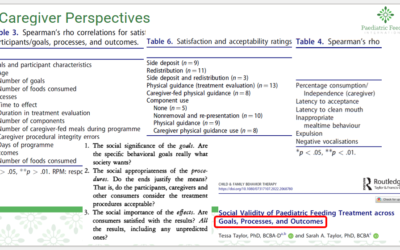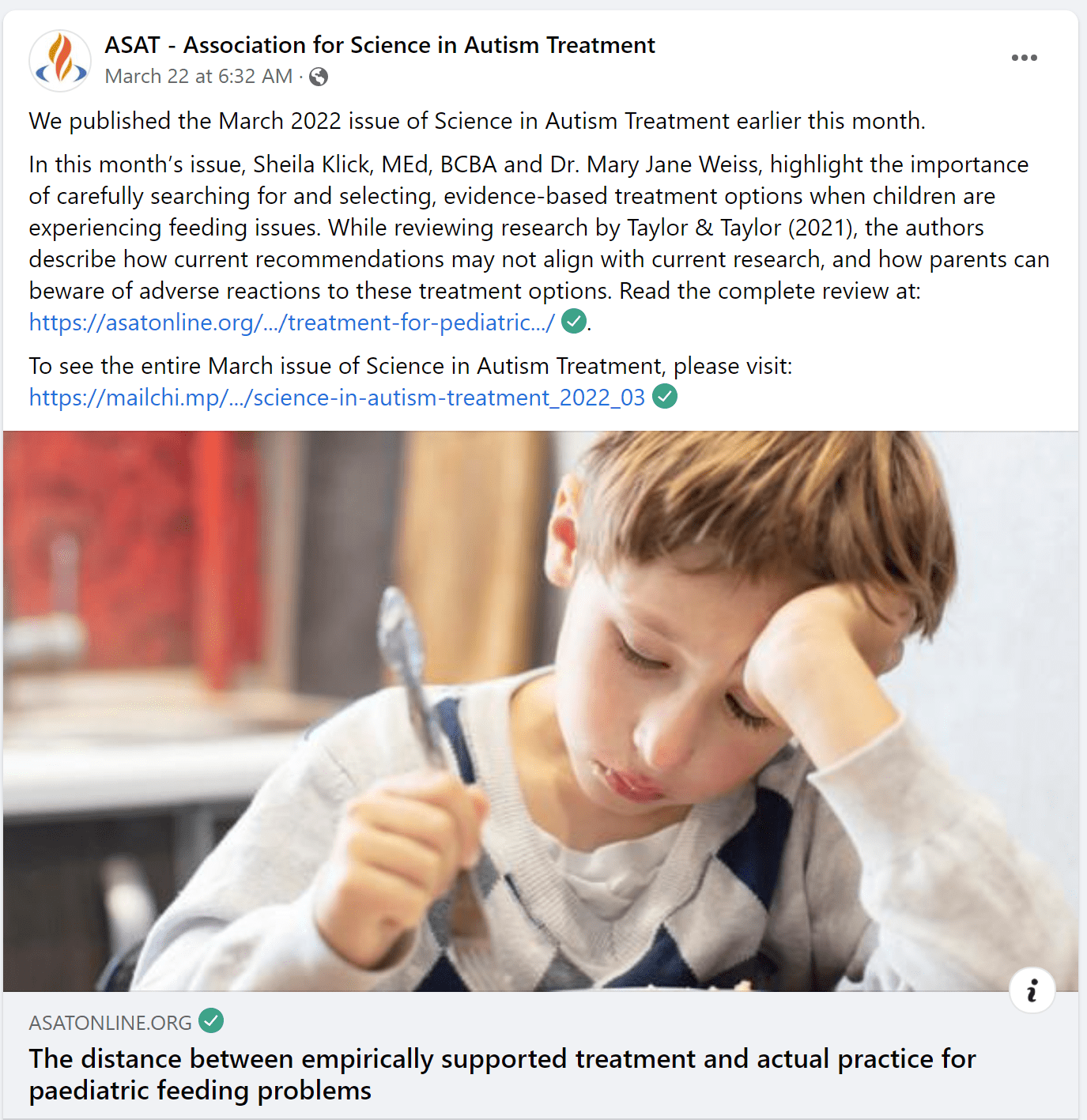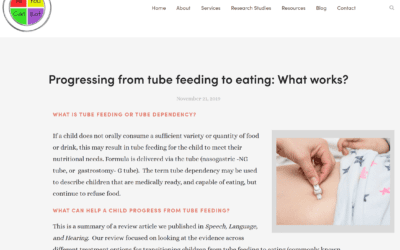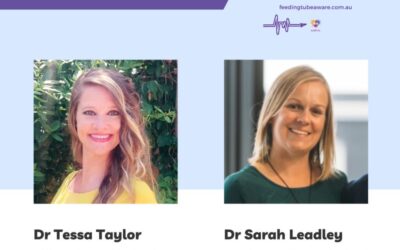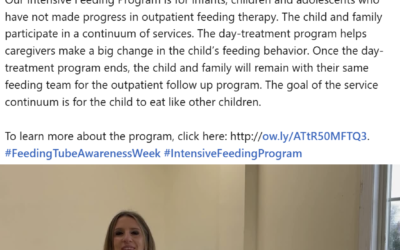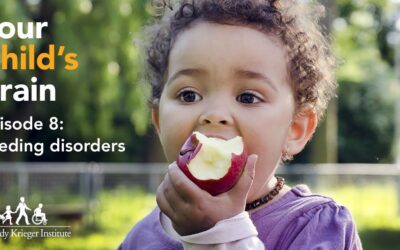Feeding Forward: From Fussy to Foodie
Serving up paediatric feeding insights to progress from picky to plating:
Little bites, big leaps
Stirring up clinical research, in-depth case studies, and practical guides, a curated information hub and treasure trove distilling years of dedicated study and firsthand experience into actionable knowledge, designed to be a go-to resource for caregivers, clinicians, and researchers. We strive to empower those navigating paediatric feeding challenges with cutting-edge knowledge that fuels innovation and transforms care. #GumbeauxYaYa #CaC’estBon #AllonsManger #Bam!
This information is provided for reference only. The content is not intended to advertise specific outcomes or create unreasonable expectations. Therapeutic decisions should be made in consultation with a registered health practitioner. Information provided is not a substitute for professional medical advice.
Explore Our Content
Organised into accessible sections, whether you’re exploring featured insights, diving into publications, accessing practical resources, or engaging with leading presentations, each category offers a deeper understanding of the application of evidence-based strategies.
Research
Dive into the gateway to our latest peer-reviewed literature on paediatric feeding.
Stay informed with our comprehensive reviews and detailed commentary on the work and research excellence that laid the groundwork for evidence-based practice in feeding.
Explore in-depth clinical analyses on feeding interventions.
Packed with a wealth of user-friendly guides, downloadable materials, and practical overviews, breaking down complex challenges into tangible support for identifying and addressing day-to-day feeding challenges.
Curated from years of hands-on experience and study, these tools empower parents, professionals, and investigators alike seeking to improve feeding outcomes.
Featuring engaging lectures, conference talks, and webinar recordings on feeding evaluation and strategies.
Multi-media content born from expertise on translating research into real-world application.
Stay inspired by engaging with dynamic content on the latest advances in feeding therapies.
Highlighted Insights
Featured & Latest Content
Discover our curated selection of essential reads that provide invaluable insights into paediatric feeding. These articles are handpicked for their relevance and impact, showcasing key topics and innovative solutions, exemplifying the transformative work in advancing paediatric feeding science and practice.

PRECI (Professionals & Researchers in Early Childhood) Conference
Early empirically-supported treatment for paediatric feeding is paramount to most areas of a child’s life, but largely limited to multidisciplinary hospitals in USA. Most children internationally are not receiving effective timely treatment. We present controlled outcomes of successful translation of solely behaviour-analytic treatment to in-home Australia with gains maintained to 2 years. This can have enduring rippling benefits and prevent significant impact to child development/health and waste of critical time/funding.
New free full-text article “Incorporating social validity into practice: Treatment progression across pediatric feeding skill domains”
On multimodal social validity assessment (including direct objective recipient measures) with heaps of practical implications, and one of my most preferred/tippie top/fun treatment arrangements and data collection keys to add (h = happy) ever. Variety record 224 🥇
Long-term Maintenance Article with Positive Effects Lasting up to 13 Years
Follow-up of 47 children with no negative ratings or side-effects found. Results suggest that behavior-analytic intervention in an intensive feeding program produced positive short- and long-term outcomes for children and their families.
Join Empire State University Center for Autism Advocacy: Research, Education, and Supports (CAARES) and the Anderson Center for our Partners in ABA Conference, Everyday ABA: Advancing Quality of Life & Advocacy
Register now for the Partners in ABA Conference to join Dr. Tessa Taylor, Ph.D., BCBA-D for “Incorporating Social Validity into Practice: Treatment Progression Across Paediatric Feeding Skill Domains.”
Speaker Spotlight
Dr. Taylor is the founder of Paediatric Feeding International (AUZ) in addition to serving at the University of Canterbury e Whare Wānanga o Waitaha (NZ). Her session will focus on outcome measures in pediatric feeding intervention and methods to assess social validity.
Feeding/ARFID/Tube Presentation at the 2024 APS College of Clinical Psychologists Conference in Adelaide, 22 – 24 March 2024
I look forward to presenting "Empirically-Supported Treatment for Paediatric Feeding/ARFID: Tube Feeding to Eating, Hospital to Home" at the 2024 APS College of Clinical Psychologists Conference in Adelaide, 22 - 24 March 2024.I invite you to join me in attending and making the most of this...
Dr. Ibañez: Overview and tour of her paediatric feeding clinic in a 5-minute video
“The work that these brilliant and passionate team members do each day is life changing for the individuals and families that they have the opportunity to serve.”
Dr. “Vivian Ibañez understands the power of food. It’s a vital element for survival, but it’s more than mere sustenance. It serves as a cultural anchor, shaping identity and fostering a sense of belonging. … Despite the universal importance of food, the intricacies of eating are often overlooked.”
“The accompanying health benefits are also clear. As eating and nutrition improve, many of Ibañez’s patients gain weight, and their g-tubes are taken out. “You can see the changes in their features,” she said. “They look healthier, and a lot of the kids who struggle in other areas like speech or toileting are making related improvements while in our program.”
RESEARCH
New article: Redistribution for regular texture bites for clinical paediatric feeding cases in-home
https://journals.lww.com/iycjournal/Abstract/2022/10000/Redistribution_for_Regular_Texture_Bites_for.4.aspx
Development of Medication Administration Protocols for In-Home Pediatric Feeding Cases
Many parents report huge struggles in trying to get their kids to take medicine, laxatives, or supplements. After intervention, if children get off of feeding tubes or baby bottles, parents need new ways to get medications in. Even though this is a very frequent and super important issue, outside...
New article: Social Validity of Paediatric Feeding Treatment across Goals, Processes, and Outcomes
Surprisingly, despite its importance and attention given in discussion currently in our field, supporting data and research are very much lacking. Data are needed in paediatric feeding to help accurately disseminate this highly important, effective, acceptable, and valued treatment, increasing access to treatment for families in need to improve their quality of life, and increasing opportunities for training/education for professionals. This is the first report to our knowledge to analyse social validity data comprehensively across variables such as participant characteristics, goals, treatment processes, treatment components, and outcomes. Ratings were high across the board (4.8 & 4.9 out of 5). Check out the results/graphs/tables! Future research could get caregiver input to design assessments, and use methods to analyse open-ended data (as in Anderson et al., 2021), in addition to the extensions to this work in Taylor & Taylor 2022b.
New JABA article: Taylor & Lanovaz (2022): Agreement between visual inspection and objective analysis methods: A replication and extension
I was trained separately on group statistics and visual inspection of single-case experimental design, but not trained on objective supplements for visual inspection. After much searching I found this novel approach (machine learning/artificial intelligence) by Dr. Marc Lanovaz that is being used in many other fields such as medicine. This method could improve accuracy of decision making, training efficiency, and communicability/quantification of results.
New full text article: Social Validity of Pediatric Feeding Treatment Components Across Time
Free editable surveys to use! Check out the supplementary docs for this article (scroll to the bottom at https://onlinelibrary.wiley.com/doi/10.1002/bin.1879). These could be used by both practitioners and researchers, and adapted for any area of ABA, not just feeding. Lots of clinical utility and future directions for further research.
What Works in Paediatric Feeding? Our Publication Featured by the Association for Science in Autism Treatment: Research Synopsis
“In this month’s issue, Sheila Klick, MEd, BCBA and Dr. Mary Jane Weiss, highlight the importance of carefully searching for and selecting, evidence-based treatment options when children are experiencing feeding issues. While reviewing research by Taylor & Taylor (2021), the authors describe how current recommendations may not align with current research, and how parents can beware of adverse reactions to these treatment options.” The distance between empirically-supported treatment and actual practice for paediatric feeding problems
RESOURCES
Learn more about paediatric feeding disorder/ARFID and tube weaning: Free webinars from Kennedy Krieger (KKI)!
Learn more about paediatric feeding disorder (including ARFID and feeding tube weaning [gastrostomy tube/g-tube; nasogastric tube/NG tube) for free from the experts at Kennedy Krieger (KKI)!...
Progressing from tube feeding to eating (i.e., tube weaning) with paediatric feeding therapy: What works? by Dr. Sarah Ann Taylor
“Our review focused on looking at the evidence across different treatment options for transitioning children from tube feeding to eating (commonly known as tube weaning).” “Behavioural treatments reported significant gains in oral consumption and improvement in mealtime behaviours but there were less reports of children being tube weaned. Behavioural studies often involved children with very complex and severe feeding difficulties, and many had DD.” “A high level of treatment intensity is needed, at least over a few weeks. This involves multiple meals per day, over consecutive days.”
ausEE’s Feeding Tube Awareness Week: Specialist Spotlight
During last year’s FTAW 2022 Virtual Education Program, Dr Tessa Taylor and Dr Sarah Leadley presented their research on childhood feeding difficulties and experience with home-based interventions in Australia and New Zealand to help children with tube dependence learn to eat new foods and progress with feeding skills.
Dr. Kathryn Peterson video: Transitioning from tube feeding to eating
Dr. Kathryn Peterson, Children’s Specialized Hospital’s Director of Intensive Feeding Program Operations, is here to share how our Pediatric Intensive Feeding Program works with kids who are ready to transition off of tube feedings.
Feeding Tube Awareness Week: Success Stories from Dr. Kathryn Peterson
“The Dalai Lama noted that, “Genuine compassion is based on a clear acceptance or recognition that others, like oneself, want happiness and have the right to overcome suffering.”
Children have the right to overcome suffering–particularly when they are missing critical nutrients and sufficient calories–in a manner that leads to efficient and robust outcomes. … As the caregiver herself noted, delays to these obtained effects might have led to “an unknown amount of traumatic NG insertions, ER visits, hospital admissions, infections, surgeries, etc.”
“I’ve seen the feeding team work their magic to rid children of scurvy, avoid or remove feeding tubes, reduce failure-to-thrive, and decrease hospital admissions. To me, this is the epitome of being compassionate providers who mitigate the risk of trauma through effective intervention.”
Johns Hopkins/Kennedy Krieger (KKI) Resources: Feeding Podcast with Dr. Girolami & Home Plate Blog
On this month’s episode of Your Child’s Brain #podcast on WYPR, Dr. Brad Schlaggar, President and CEO, and Dr. Peter Girolami, Director of the Pediatric Feeding Disorders Program, joined Dr. Richard Katz of Mt. Washington Pediatric Hospital to discuss #feedingdisorders in infants, toddlers, children and teens. Listen now: https://bit.ly/3B3YiVn #YourChildsBrain #PediatricFeedingDisorders
Also Join us on a Feedign Journey: Free articles from KKI’s Blog, Home Plate.
PRESENTATIONS
ausEE Feeding Tube Awareness Week Virtual Education Presentation: From Tube Feeding to Eating: Home-based Behavioural Intervention (Taylor & Taylor, 2022)
From Dr. Sarah Leadley Taylor in Auckland, NZ's social validity assessment scale development research on caregiver perspectives: Ana & Temika's Experience Anderson, R., Taylor, S., Taylor, T., & Virues-Ortega, J. (2021). Thematic and textual analysis methods for developing social validity...
Stay Informed with Our Latest Updates
Join our community to receive the latest insights, resources, & updates on paediatric feeding directly to your inbox. Stay ahead with carefully curated content tailored for you.
Founder of of Paediatric Feeding International https://www.paediatricfeedingintl.com/about-us/
TOPICS
paediatric feeding disorder (PFD) | avoidant/restrictive food intake disorder (ARFID) | gastrostomy tube/G-tube, nasogastric tube/NG-tube | tube weaning/dependency, transition from tube to oral | failure to thrive/faltering growth/growth impairment | nutritional deficiencies | inappropriate mealtime behaviour (IMB) | food refusal/selectivity | fussy/picky/selective eater/eating | oral/eating/food aversion/sensitivities | mealtime independence/skills | gagging, coughing, vomiting | temperature/preparation/brand/colour/cutlery/crockery selectivity | setting/time/feeder selectivity | out of seat (not sitting at table) | caregiver stress, dreading mealtimes | constipation | dehydration | low appetite/skipping meals, grazing | applied behaviour analysis (ABA) | behaviour-analytic/behavioural treatment/therapy/support/services | in-home therapy/translation | autism, developmental delay, intellectual disability | premie/prematuriy/premature birth | food allergy | reflux


